Report on Leadership, Management, and Operations at Corus (BUS101)
VerifiedAdded on 2020/10/22
|12
|3961
|352
Report
AI Summary
This report provides an analysis of leadership and management practices within Corus, a steel manufacturing company. It begins by differentiating between the roles and characteristics of leaders and managers, emphasizing their distinct responsibilities in achieving organizational goals. The report then examines the application of leadership and management in various situational contexts, such as conflict resolution and staff turnover, highlighting the importance of situational leadership and leadership traits. Furthermore, it explores different leadership theories and models, including situational, systems, and contingency approaches, and assesses their strengths and weaknesses. The report then delves into key approaches to operations management, such as Six Sigma and Lean Manufacturing, and discusses the roles of leaders and managers in implementing these approaches to achieve business objectives. Finally, it assesses the factors within the business environment that impact operational management and decision-making, concluding with a comprehensive overview of the relationship between leadership, management, and operational effectiveness within the context of Corus's business operations.
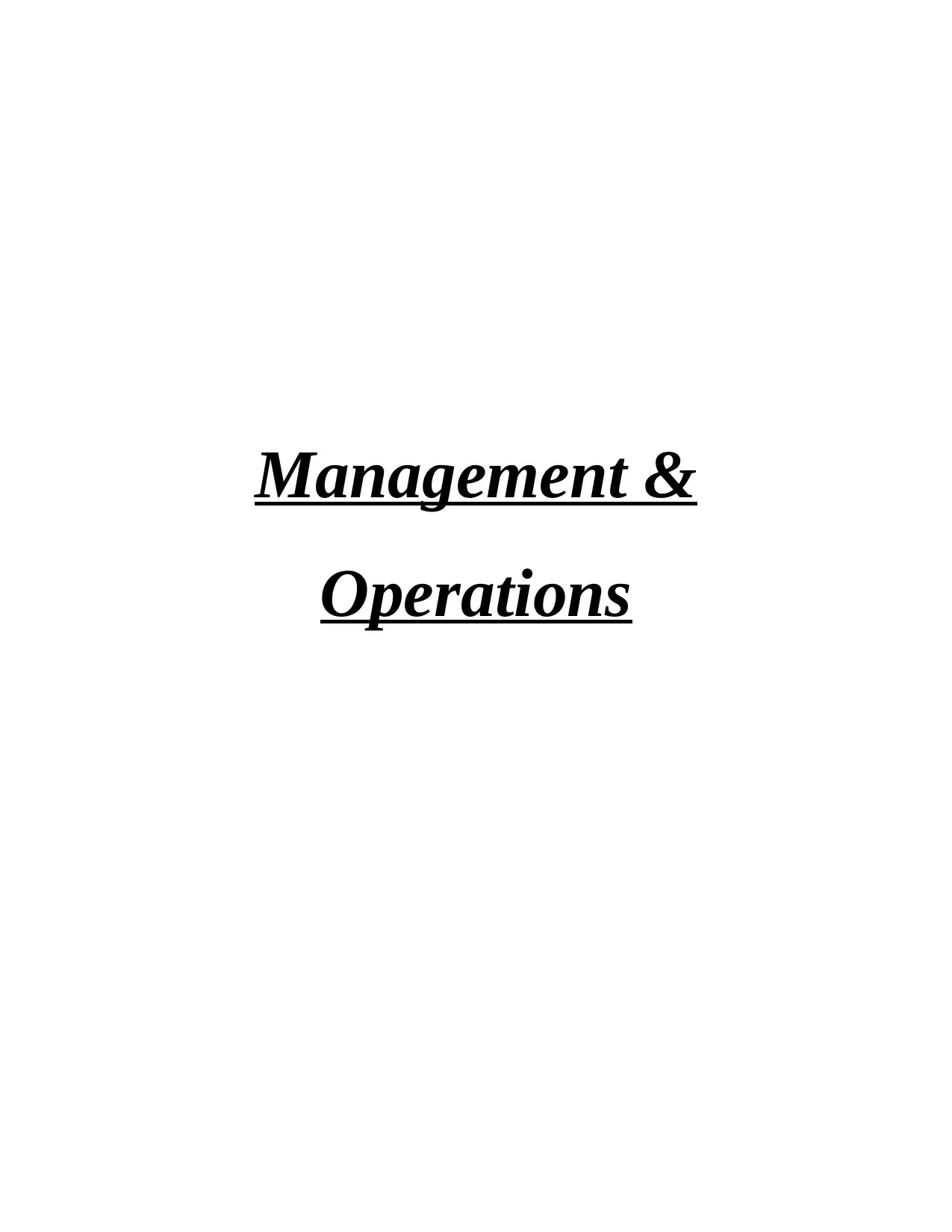
Management &
Operations
Operations
Paraphrase This Document
Need a fresh take? Get an instant paraphrase of this document with our AI Paraphraser
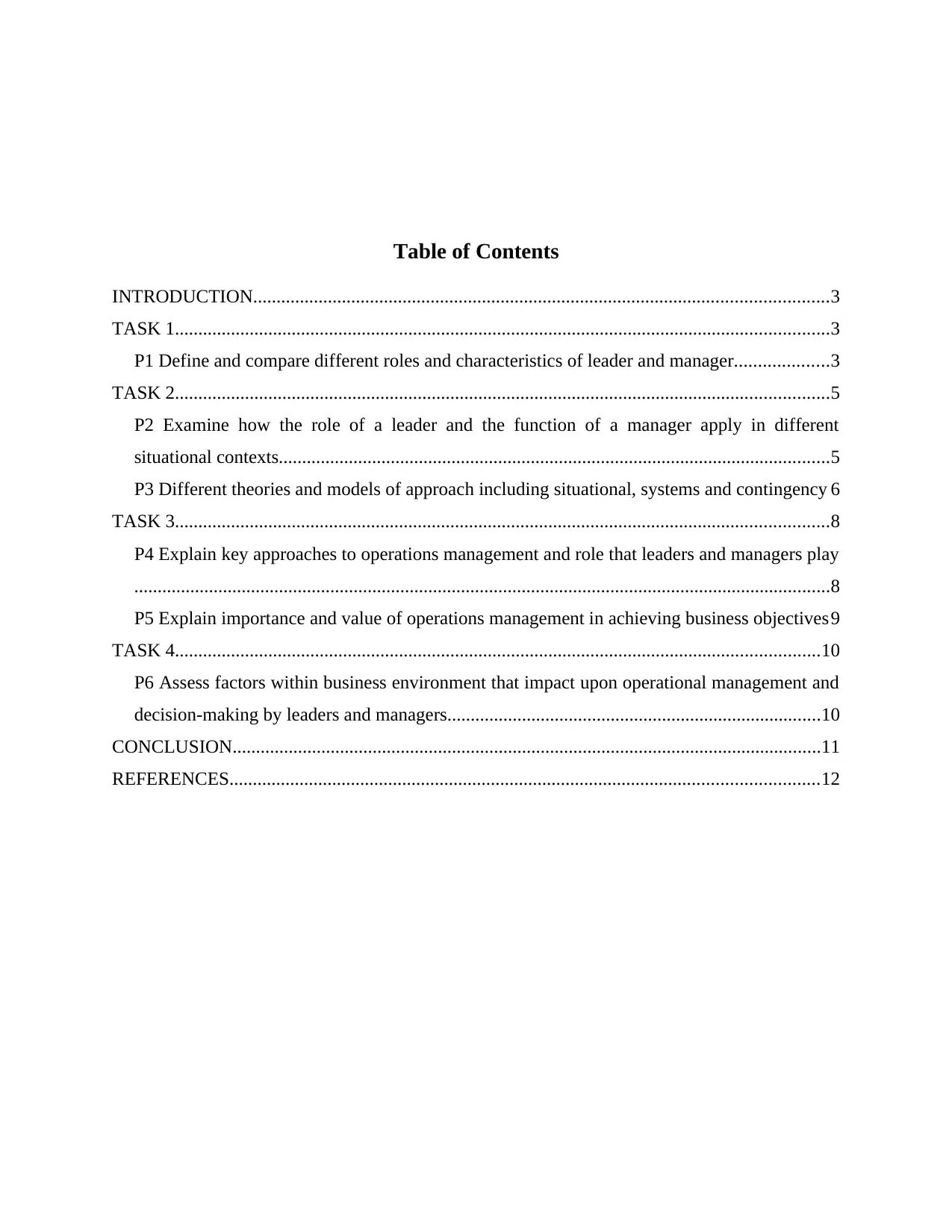
Table of Contents
INTRODUCTION...........................................................................................................................3
TASK 1............................................................................................................................................3
P1 Define and compare different roles and characteristics of leader and manager....................3
TASK 2............................................................................................................................................5
P2 Examine how the role of a leader and the function of a manager apply in different
situational contexts......................................................................................................................5
P3 Different theories and models of approach including situational, systems and contingency 6
TASK 3............................................................................................................................................8
P4 Explain key approaches to operations management and role that leaders and managers play
.....................................................................................................................................................8
P5 Explain importance and value of operations management in achieving business objectives9
TASK 4..........................................................................................................................................10
P6 Assess factors within business environment that impact upon operational management and
decision-making by leaders and managers................................................................................10
CONCLUSION..............................................................................................................................11
REFERENCES..............................................................................................................................12
INTRODUCTION...........................................................................................................................3
TASK 1............................................................................................................................................3
P1 Define and compare different roles and characteristics of leader and manager....................3
TASK 2............................................................................................................................................5
P2 Examine how the role of a leader and the function of a manager apply in different
situational contexts......................................................................................................................5
P3 Different theories and models of approach including situational, systems and contingency 6
TASK 3............................................................................................................................................8
P4 Explain key approaches to operations management and role that leaders and managers play
.....................................................................................................................................................8
P5 Explain importance and value of operations management in achieving business objectives9
TASK 4..........................................................................................................................................10
P6 Assess factors within business environment that impact upon operational management and
decision-making by leaders and managers................................................................................10
CONCLUSION..............................................................................................................................11
REFERENCES..............................................................................................................................12
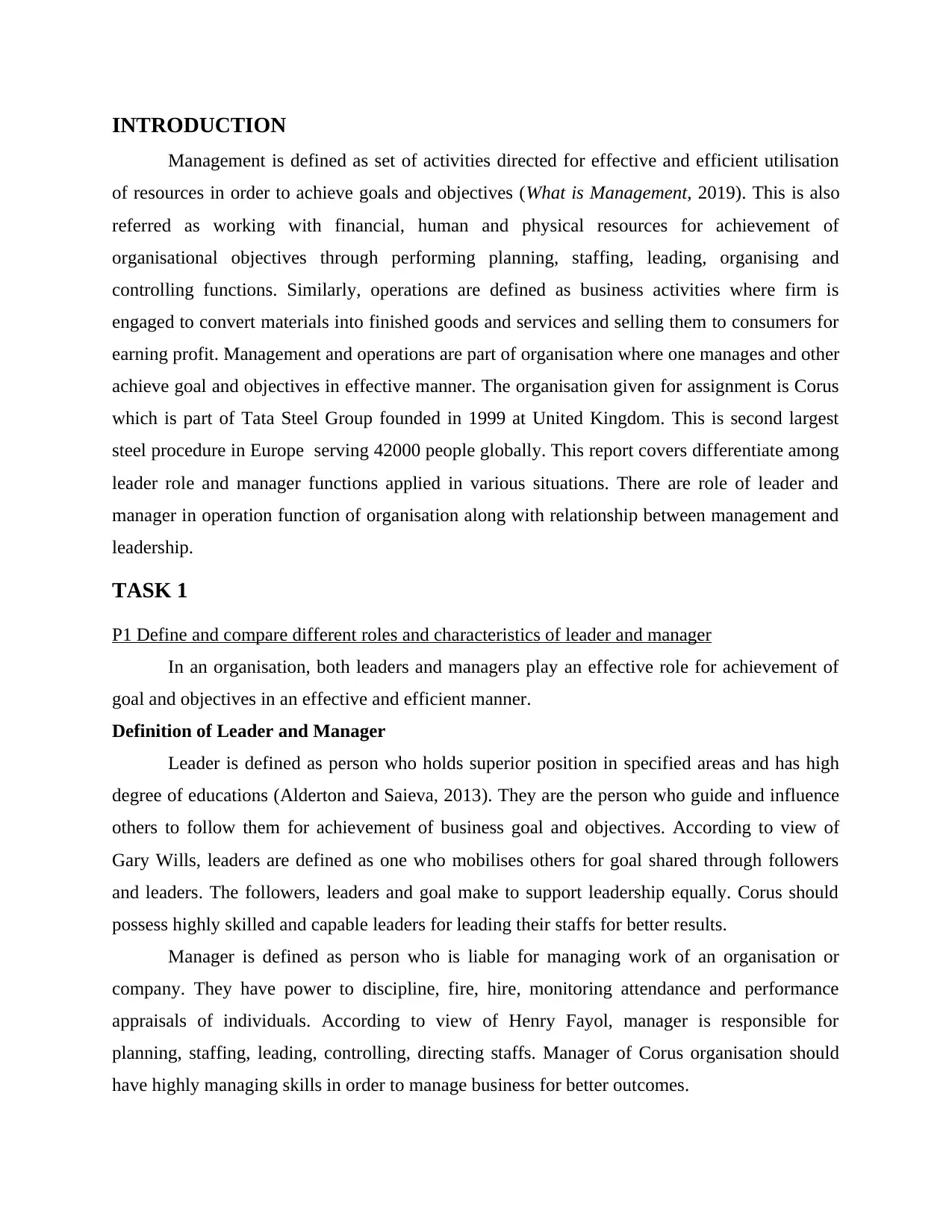
INTRODUCTION
Management is defined as set of activities directed for effective and efficient utilisation
of resources in order to achieve goals and objectives (What is Management, 2019). This is also
referred as working with financial, human and physical resources for achievement of
organisational objectives through performing planning, staffing, leading, organising and
controlling functions. Similarly, operations are defined as business activities where firm is
engaged to convert materials into finished goods and services and selling them to consumers for
earning profit. Management and operations are part of organisation where one manages and other
achieve goal and objectives in effective manner. The organisation given for assignment is Corus
which is part of Tata Steel Group founded in 1999 at United Kingdom. This is second largest
steel procedure in Europe serving 42000 people globally. This report covers differentiate among
leader role and manager functions applied in various situations. There are role of leader and
manager in operation function of organisation along with relationship between management and
leadership.
TASK 1
P1 Define and compare different roles and characteristics of leader and manager
In an organisation, both leaders and managers play an effective role for achievement of
goal and objectives in an effective and efficient manner.
Definition of Leader and Manager
Leader is defined as person who holds superior position in specified areas and has high
degree of educations (Alderton and Saieva, 2013). They are the person who guide and influence
others to follow them for achievement of business goal and objectives. According to view of
Gary Wills, leaders are defined as one who mobilises others for goal shared through followers
and leaders. The followers, leaders and goal make to support leadership equally. Corus should
possess highly skilled and capable leaders for leading their staffs for better results.
Manager is defined as person who is liable for managing work of an organisation or
company. They have power to discipline, fire, hire, monitoring attendance and performance
appraisals of individuals. According to view of Henry Fayol, manager is responsible for
planning, staffing, leading, controlling, directing staffs. Manager of Corus organisation should
have highly managing skills in order to manage business for better outcomes.
Management is defined as set of activities directed for effective and efficient utilisation
of resources in order to achieve goals and objectives (What is Management, 2019). This is also
referred as working with financial, human and physical resources for achievement of
organisational objectives through performing planning, staffing, leading, organising and
controlling functions. Similarly, operations are defined as business activities where firm is
engaged to convert materials into finished goods and services and selling them to consumers for
earning profit. Management and operations are part of organisation where one manages and other
achieve goal and objectives in effective manner. The organisation given for assignment is Corus
which is part of Tata Steel Group founded in 1999 at United Kingdom. This is second largest
steel procedure in Europe serving 42000 people globally. This report covers differentiate among
leader role and manager functions applied in various situations. There are role of leader and
manager in operation function of organisation along with relationship between management and
leadership.
TASK 1
P1 Define and compare different roles and characteristics of leader and manager
In an organisation, both leaders and managers play an effective role for achievement of
goal and objectives in an effective and efficient manner.
Definition of Leader and Manager
Leader is defined as person who holds superior position in specified areas and has high
degree of educations (Alderton and Saieva, 2013). They are the person who guide and influence
others to follow them for achievement of business goal and objectives. According to view of
Gary Wills, leaders are defined as one who mobilises others for goal shared through followers
and leaders. The followers, leaders and goal make to support leadership equally. Corus should
possess highly skilled and capable leaders for leading their staffs for better results.
Manager is defined as person who is liable for managing work of an organisation or
company. They have power to discipline, fire, hire, monitoring attendance and performance
appraisals of individuals. According to view of Henry Fayol, manager is responsible for
planning, staffing, leading, controlling, directing staffs. Manager of Corus organisation should
have highly managing skills in order to manage business for better outcomes.
⊘ This is a preview!⊘
Do you want full access?
Subscribe today to unlock all pages.

Trusted by 1+ million students worldwide
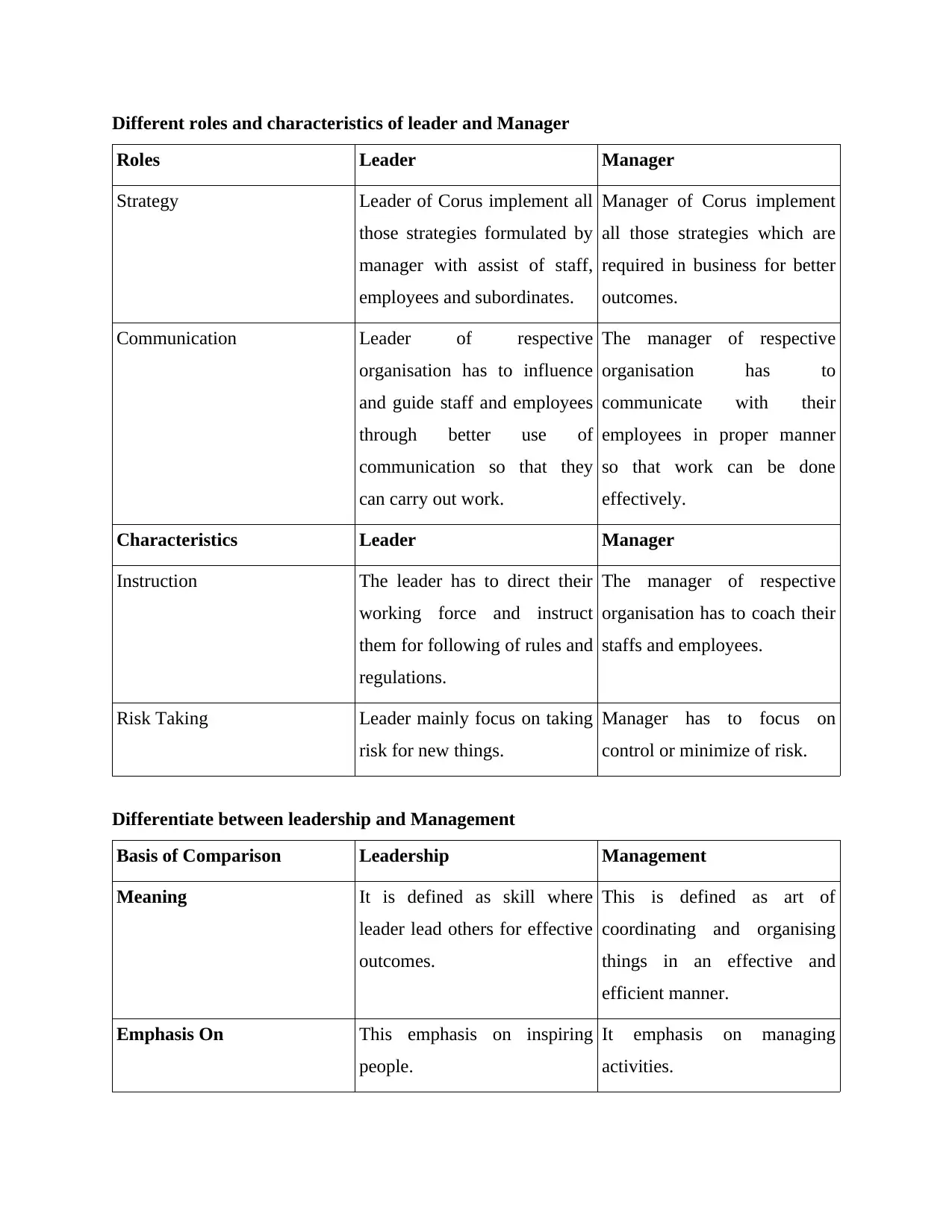
Different roles and characteristics of leader and Manager
Roles Leader Manager
Strategy Leader of Corus implement all
those strategies formulated by
manager with assist of staff,
employees and subordinates.
Manager of Corus implement
all those strategies which are
required in business for better
outcomes.
Communication Leader of respective
organisation has to influence
and guide staff and employees
through better use of
communication so that they
can carry out work.
The manager of respective
organisation has to
communicate with their
employees in proper manner
so that work can be done
effectively.
Characteristics Leader Manager
Instruction The leader has to direct their
working force and instruct
them for following of rules and
regulations.
The manager of respective
organisation has to coach their
staffs and employees.
Risk Taking Leader mainly focus on taking
risk for new things.
Manager has to focus on
control or minimize of risk.
Differentiate between leadership and Management
Basis of Comparison Leadership Management
Meaning It is defined as skill where
leader lead others for effective
outcomes.
This is defined as art of
coordinating and organising
things in an effective and
efficient manner.
Emphasis On This emphasis on inspiring
people.
It emphasis on managing
activities.
Roles Leader Manager
Strategy Leader of Corus implement all
those strategies formulated by
manager with assist of staff,
employees and subordinates.
Manager of Corus implement
all those strategies which are
required in business for better
outcomes.
Communication Leader of respective
organisation has to influence
and guide staff and employees
through better use of
communication so that they
can carry out work.
The manager of respective
organisation has to
communicate with their
employees in proper manner
so that work can be done
effectively.
Characteristics Leader Manager
Instruction The leader has to direct their
working force and instruct
them for following of rules and
regulations.
The manager of respective
organisation has to coach their
staffs and employees.
Risk Taking Leader mainly focus on taking
risk for new things.
Manager has to focus on
control or minimize of risk.
Differentiate between leadership and Management
Basis of Comparison Leadership Management
Meaning It is defined as skill where
leader lead others for effective
outcomes.
This is defined as art of
coordinating and organising
things in an effective and
efficient manner.
Emphasis On This emphasis on inspiring
people.
It emphasis on managing
activities.
Paraphrase This Document
Need a fresh take? Get an instant paraphrase of this document with our AI Paraphraser
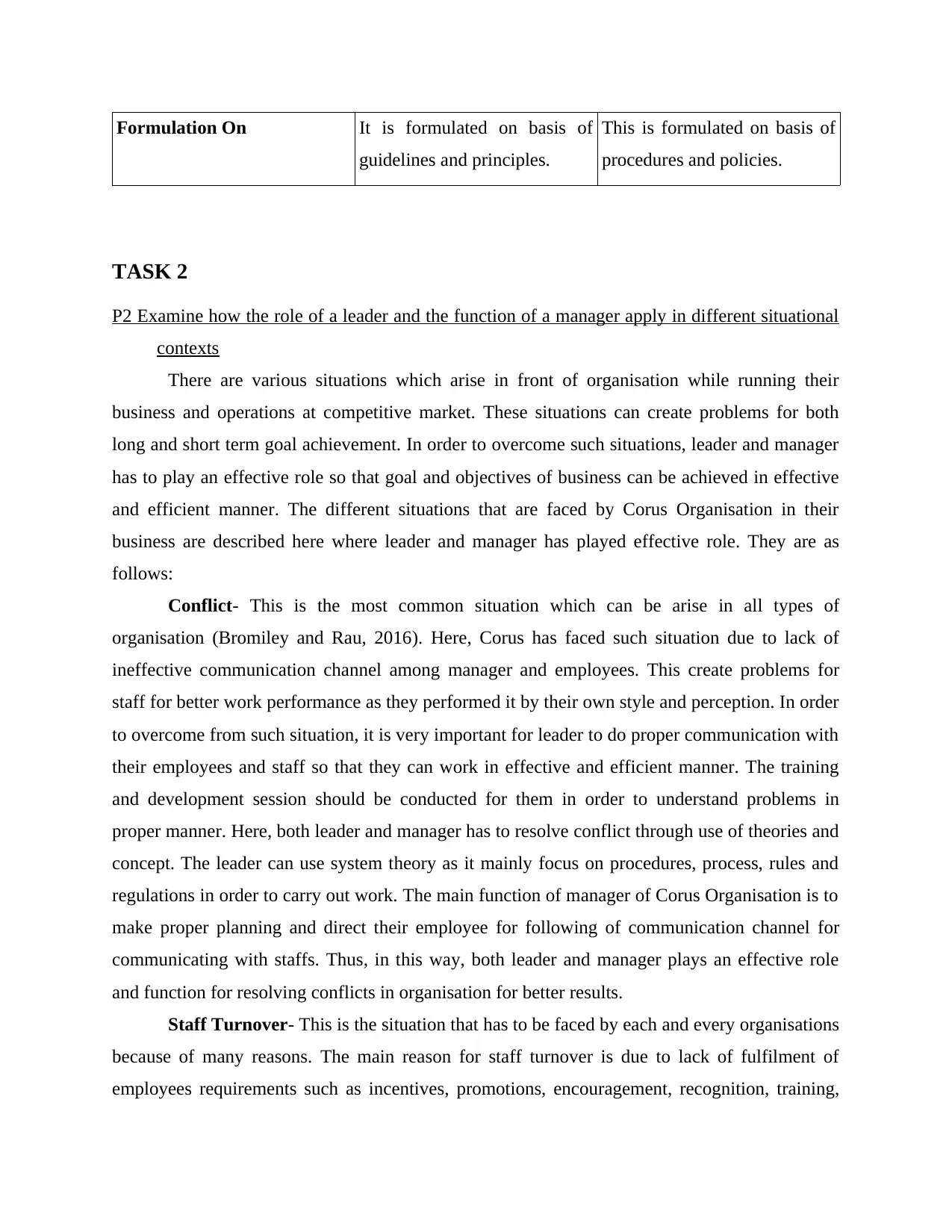
Formulation On It is formulated on basis of
guidelines and principles.
This is formulated on basis of
procedures and policies.
TASK 2
P2 Examine how the role of a leader and the function of a manager apply in different situational
contexts
There are various situations which arise in front of organisation while running their
business and operations at competitive market. These situations can create problems for both
long and short term goal achievement. In order to overcome such situations, leader and manager
has to play an effective role so that goal and objectives of business can be achieved in effective
and efficient manner. The different situations that are faced by Corus Organisation in their
business are described here where leader and manager has played effective role. They are as
follows:
Conflict- This is the most common situation which can be arise in all types of
organisation (Bromiley and Rau, 2016). Here, Corus has faced such situation due to lack of
ineffective communication channel among manager and employees. This create problems for
staff for better work performance as they performed it by their own style and perception. In order
to overcome from such situation, it is very important for leader to do proper communication with
their employees and staff so that they can work in effective and efficient manner. The training
and development session should be conducted for them in order to understand problems in
proper manner. Here, both leader and manager has to resolve conflict through use of theories and
concept. The leader can use system theory as it mainly focus on procedures, process, rules and
regulations in order to carry out work. The main function of manager of Corus Organisation is to
make proper planning and direct their employee for following of communication channel for
communicating with staffs. Thus, in this way, both leader and manager plays an effective role
and function for resolving conflicts in organisation for better results.
Staff Turnover- This is the situation that has to be faced by each and every organisations
because of many reasons. The main reason for staff turnover is due to lack of fulfilment of
employees requirements such as incentives, promotions, encouragement, recognition, training,
guidelines and principles.
This is formulated on basis of
procedures and policies.
TASK 2
P2 Examine how the role of a leader and the function of a manager apply in different situational
contexts
There are various situations which arise in front of organisation while running their
business and operations at competitive market. These situations can create problems for both
long and short term goal achievement. In order to overcome such situations, leader and manager
has to play an effective role so that goal and objectives of business can be achieved in effective
and efficient manner. The different situations that are faced by Corus Organisation in their
business are described here where leader and manager has played effective role. They are as
follows:
Conflict- This is the most common situation which can be arise in all types of
organisation (Bromiley and Rau, 2016). Here, Corus has faced such situation due to lack of
ineffective communication channel among manager and employees. This create problems for
staff for better work performance as they performed it by their own style and perception. In order
to overcome from such situation, it is very important for leader to do proper communication with
their employees and staff so that they can work in effective and efficient manner. The training
and development session should be conducted for them in order to understand problems in
proper manner. Here, both leader and manager has to resolve conflict through use of theories and
concept. The leader can use system theory as it mainly focus on procedures, process, rules and
regulations in order to carry out work. The main function of manager of Corus Organisation is to
make proper planning and direct their employee for following of communication channel for
communicating with staffs. Thus, in this way, both leader and manager plays an effective role
and function for resolving conflicts in organisation for better results.
Staff Turnover- This is the situation that has to be faced by each and every organisations
because of many reasons. The main reason for staff turnover is due to lack of fulfilment of
employees requirements such as incentives, promotions, encouragement, recognition, training,
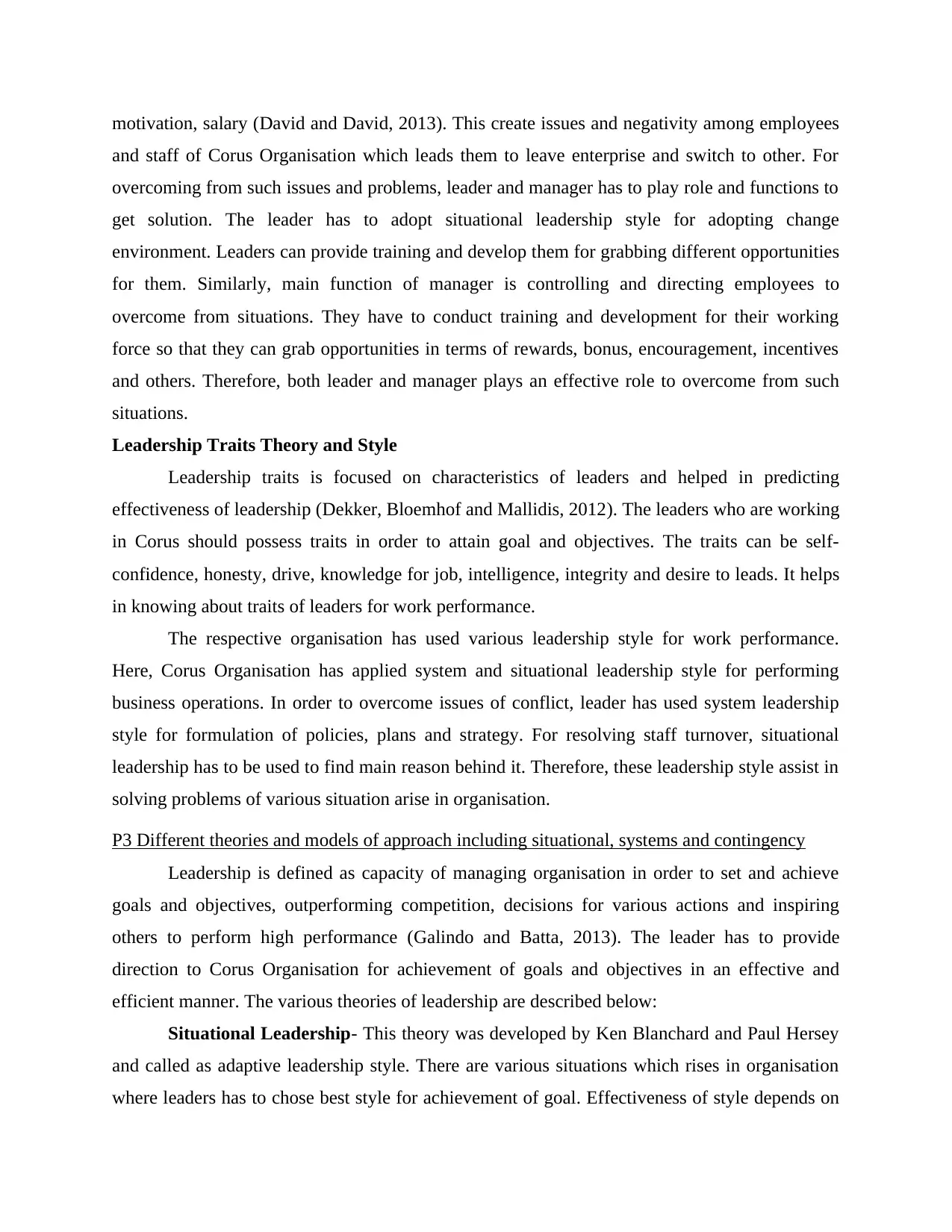
motivation, salary (David and David, 2013). This create issues and negativity among employees
and staff of Corus Organisation which leads them to leave enterprise and switch to other. For
overcoming from such issues and problems, leader and manager has to play role and functions to
get solution. The leader has to adopt situational leadership style for adopting change
environment. Leaders can provide training and develop them for grabbing different opportunities
for them. Similarly, main function of manager is controlling and directing employees to
overcome from situations. They have to conduct training and development for their working
force so that they can grab opportunities in terms of rewards, bonus, encouragement, incentives
and others. Therefore, both leader and manager plays an effective role to overcome from such
situations.
Leadership Traits Theory and Style
Leadership traits is focused on characteristics of leaders and helped in predicting
effectiveness of leadership (Dekker, Bloemhof and Mallidis, 2012). The leaders who are working
in Corus should possess traits in order to attain goal and objectives. The traits can be self-
confidence, honesty, drive, knowledge for job, intelligence, integrity and desire to leads. It helps
in knowing about traits of leaders for work performance.
The respective organisation has used various leadership style for work performance.
Here, Corus Organisation has applied system and situational leadership style for performing
business operations. In order to overcome issues of conflict, leader has used system leadership
style for formulation of policies, plans and strategy. For resolving staff turnover, situational
leadership has to be used to find main reason behind it. Therefore, these leadership style assist in
solving problems of various situation arise in organisation.
P3 Different theories and models of approach including situational, systems and contingency
Leadership is defined as capacity of managing organisation in order to set and achieve
goals and objectives, outperforming competition, decisions for various actions and inspiring
others to perform high performance (Galindo and Batta, 2013). The leader has to provide
direction to Corus Organisation for achievement of goals and objectives in an effective and
efficient manner. The various theories of leadership are described below:
Situational Leadership- This theory was developed by Ken Blanchard and Paul Hersey
and called as adaptive leadership style. There are various situations which rises in organisation
where leaders has to chose best style for achievement of goal. Effectiveness of style depends on
and staff of Corus Organisation which leads them to leave enterprise and switch to other. For
overcoming from such issues and problems, leader and manager has to play role and functions to
get solution. The leader has to adopt situational leadership style for adopting change
environment. Leaders can provide training and develop them for grabbing different opportunities
for them. Similarly, main function of manager is controlling and directing employees to
overcome from situations. They have to conduct training and development for their working
force so that they can grab opportunities in terms of rewards, bonus, encouragement, incentives
and others. Therefore, both leader and manager plays an effective role to overcome from such
situations.
Leadership Traits Theory and Style
Leadership traits is focused on characteristics of leaders and helped in predicting
effectiveness of leadership (Dekker, Bloemhof and Mallidis, 2012). The leaders who are working
in Corus should possess traits in order to attain goal and objectives. The traits can be self-
confidence, honesty, drive, knowledge for job, intelligence, integrity and desire to leads. It helps
in knowing about traits of leaders for work performance.
The respective organisation has used various leadership style for work performance.
Here, Corus Organisation has applied system and situational leadership style for performing
business operations. In order to overcome issues of conflict, leader has used system leadership
style for formulation of policies, plans and strategy. For resolving staff turnover, situational
leadership has to be used to find main reason behind it. Therefore, these leadership style assist in
solving problems of various situation arise in organisation.
P3 Different theories and models of approach including situational, systems and contingency
Leadership is defined as capacity of managing organisation in order to set and achieve
goals and objectives, outperforming competition, decisions for various actions and inspiring
others to perform high performance (Galindo and Batta, 2013). The leader has to provide
direction to Corus Organisation for achievement of goals and objectives in an effective and
efficient manner. The various theories of leadership are described below:
Situational Leadership- This theory was developed by Ken Blanchard and Paul Hersey
and called as adaptive leadership style. There are various situations which rises in organisation
where leaders has to chose best style for achievement of goal. Effectiveness of style depends on
⊘ This is a preview!⊘
Do you want full access?
Subscribe today to unlock all pages.

Trusted by 1+ million students worldwide
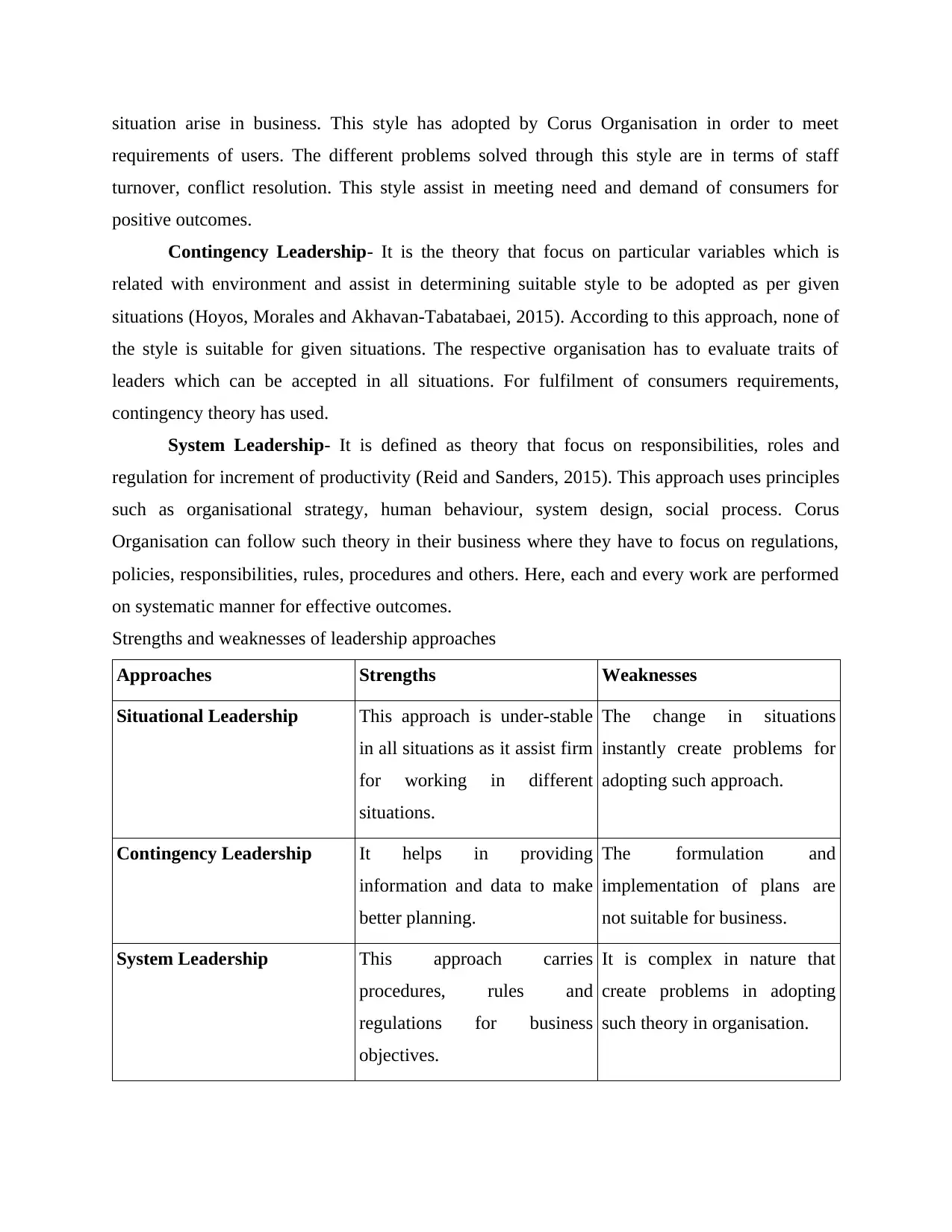
situation arise in business. This style has adopted by Corus Organisation in order to meet
requirements of users. The different problems solved through this style are in terms of staff
turnover, conflict resolution. This style assist in meeting need and demand of consumers for
positive outcomes.
Contingency Leadership- It is the theory that focus on particular variables which is
related with environment and assist in determining suitable style to be adopted as per given
situations (Hoyos, Morales and Akhavan-Tabatabaei, 2015). According to this approach, none of
the style is suitable for given situations. The respective organisation has to evaluate traits of
leaders which can be accepted in all situations. For fulfilment of consumers requirements,
contingency theory has used.
System Leadership- It is defined as theory that focus on responsibilities, roles and
regulation for increment of productivity (Reid and Sanders, 2015). This approach uses principles
such as organisational strategy, human behaviour, system design, social process. Corus
Organisation can follow such theory in their business where they have to focus on regulations,
policies, responsibilities, rules, procedures and others. Here, each and every work are performed
on systematic manner for effective outcomes.
Strengths and weaknesses of leadership approaches
Approaches Strengths Weaknesses
Situational Leadership This approach is under-stable
in all situations as it assist firm
for working in different
situations.
The change in situations
instantly create problems for
adopting such approach.
Contingency Leadership It helps in providing
information and data to make
better planning.
The formulation and
implementation of plans are
not suitable for business.
System Leadership This approach carries
procedures, rules and
regulations for business
objectives.
It is complex in nature that
create problems in adopting
such theory in organisation.
requirements of users. The different problems solved through this style are in terms of staff
turnover, conflict resolution. This style assist in meeting need and demand of consumers for
positive outcomes.
Contingency Leadership- It is the theory that focus on particular variables which is
related with environment and assist in determining suitable style to be adopted as per given
situations (Hoyos, Morales and Akhavan-Tabatabaei, 2015). According to this approach, none of
the style is suitable for given situations. The respective organisation has to evaluate traits of
leaders which can be accepted in all situations. For fulfilment of consumers requirements,
contingency theory has used.
System Leadership- It is defined as theory that focus on responsibilities, roles and
regulation for increment of productivity (Reid and Sanders, 2015). This approach uses principles
such as organisational strategy, human behaviour, system design, social process. Corus
Organisation can follow such theory in their business where they have to focus on regulations,
policies, responsibilities, rules, procedures and others. Here, each and every work are performed
on systematic manner for effective outcomes.
Strengths and weaknesses of leadership approaches
Approaches Strengths Weaknesses
Situational Leadership This approach is under-stable
in all situations as it assist firm
for working in different
situations.
The change in situations
instantly create problems for
adopting such approach.
Contingency Leadership It helps in providing
information and data to make
better planning.
The formulation and
implementation of plans are
not suitable for business.
System Leadership This approach carries
procedures, rules and
regulations for business
objectives.
It is complex in nature that
create problems in adopting
such theory in organisation.
Paraphrase This Document
Need a fresh take? Get an instant paraphrase of this document with our AI Paraphraser
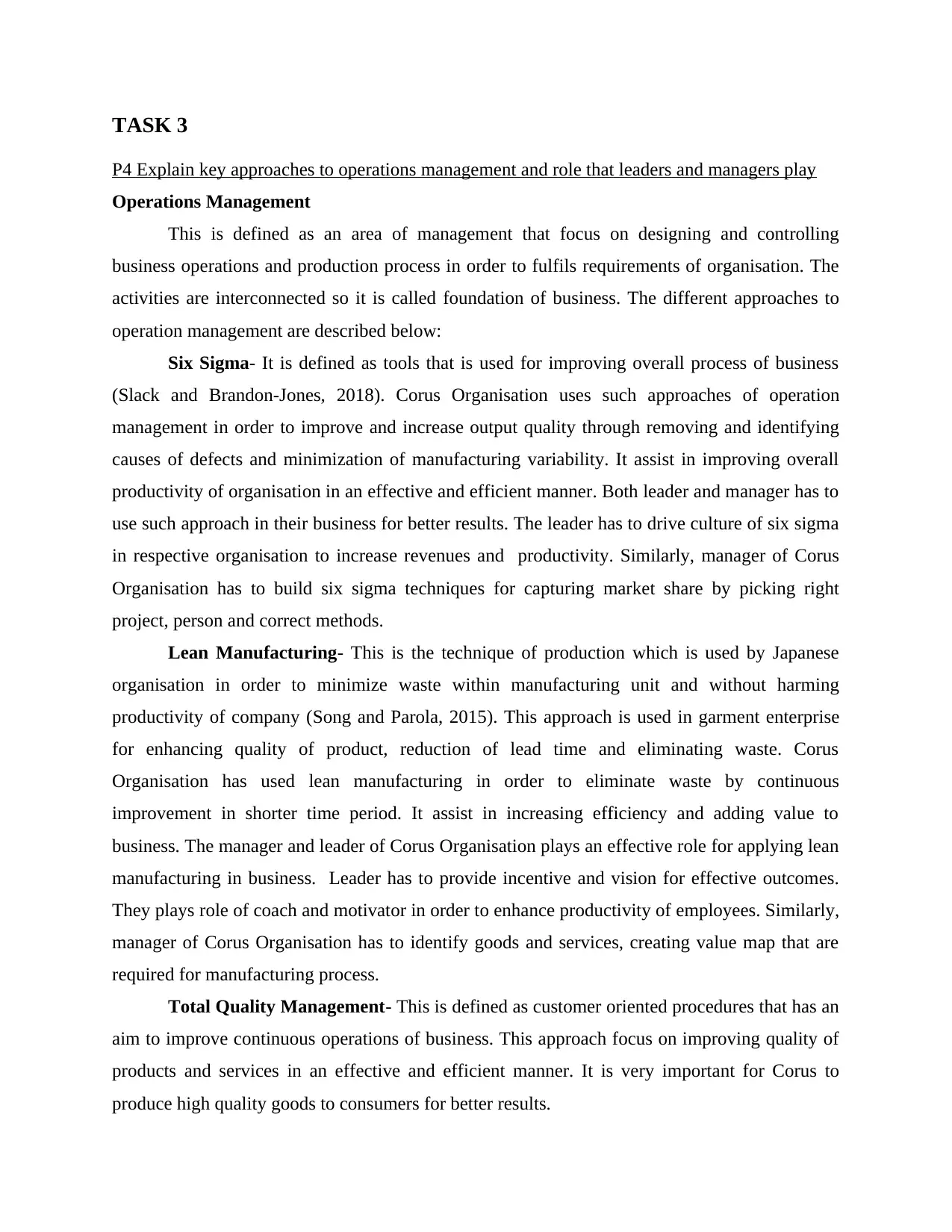
TASK 3
P4 Explain key approaches to operations management and role that leaders and managers play
Operations Management
This is defined as an area of management that focus on designing and controlling
business operations and production process in order to fulfils requirements of organisation. The
activities are interconnected so it is called foundation of business. The different approaches to
operation management are described below:
Six Sigma- It is defined as tools that is used for improving overall process of business
(Slack and Brandon-Jones, 2018). Corus Organisation uses such approaches of operation
management in order to improve and increase output quality through removing and identifying
causes of defects and minimization of manufacturing variability. It assist in improving overall
productivity of organisation in an effective and efficient manner. Both leader and manager has to
use such approach in their business for better results. The leader has to drive culture of six sigma
in respective organisation to increase revenues and productivity. Similarly, manager of Corus
Organisation has to build six sigma techniques for capturing market share by picking right
project, person and correct methods.
Lean Manufacturing- This is the technique of production which is used by Japanese
organisation in order to minimize waste within manufacturing unit and without harming
productivity of company (Song and Parola, 2015). This approach is used in garment enterprise
for enhancing quality of product, reduction of lead time and eliminating waste. Corus
Organisation has used lean manufacturing in order to eliminate waste by continuous
improvement in shorter time period. It assist in increasing efficiency and adding value to
business. The manager and leader of Corus Organisation plays an effective role for applying lean
manufacturing in business. Leader has to provide incentive and vision for effective outcomes.
They plays role of coach and motivator in order to enhance productivity of employees. Similarly,
manager of Corus Organisation has to identify goods and services, creating value map that are
required for manufacturing process.
Total Quality Management- This is defined as customer oriented procedures that has an
aim to improve continuous operations of business. This approach focus on improving quality of
products and services in an effective and efficient manner. It is very important for Corus to
produce high quality goods to consumers for better results.
P4 Explain key approaches to operations management and role that leaders and managers play
Operations Management
This is defined as an area of management that focus on designing and controlling
business operations and production process in order to fulfils requirements of organisation. The
activities are interconnected so it is called foundation of business. The different approaches to
operation management are described below:
Six Sigma- It is defined as tools that is used for improving overall process of business
(Slack and Brandon-Jones, 2018). Corus Organisation uses such approaches of operation
management in order to improve and increase output quality through removing and identifying
causes of defects and minimization of manufacturing variability. It assist in improving overall
productivity of organisation in an effective and efficient manner. Both leader and manager has to
use such approach in their business for better results. The leader has to drive culture of six sigma
in respective organisation to increase revenues and productivity. Similarly, manager of Corus
Organisation has to build six sigma techniques for capturing market share by picking right
project, person and correct methods.
Lean Manufacturing- This is the technique of production which is used by Japanese
organisation in order to minimize waste within manufacturing unit and without harming
productivity of company (Song and Parola, 2015). This approach is used in garment enterprise
for enhancing quality of product, reduction of lead time and eliminating waste. Corus
Organisation has used lean manufacturing in order to eliminate waste by continuous
improvement in shorter time period. It assist in increasing efficiency and adding value to
business. The manager and leader of Corus Organisation plays an effective role for applying lean
manufacturing in business. Leader has to provide incentive and vision for effective outcomes.
They plays role of coach and motivator in order to enhance productivity of employees. Similarly,
manager of Corus Organisation has to identify goods and services, creating value map that are
required for manufacturing process.
Total Quality Management- This is defined as customer oriented procedures that has an
aim to improve continuous operations of business. This approach focus on improving quality of
products and services in an effective and efficient manner. It is very important for Corus to
produce high quality goods to consumers for better results.
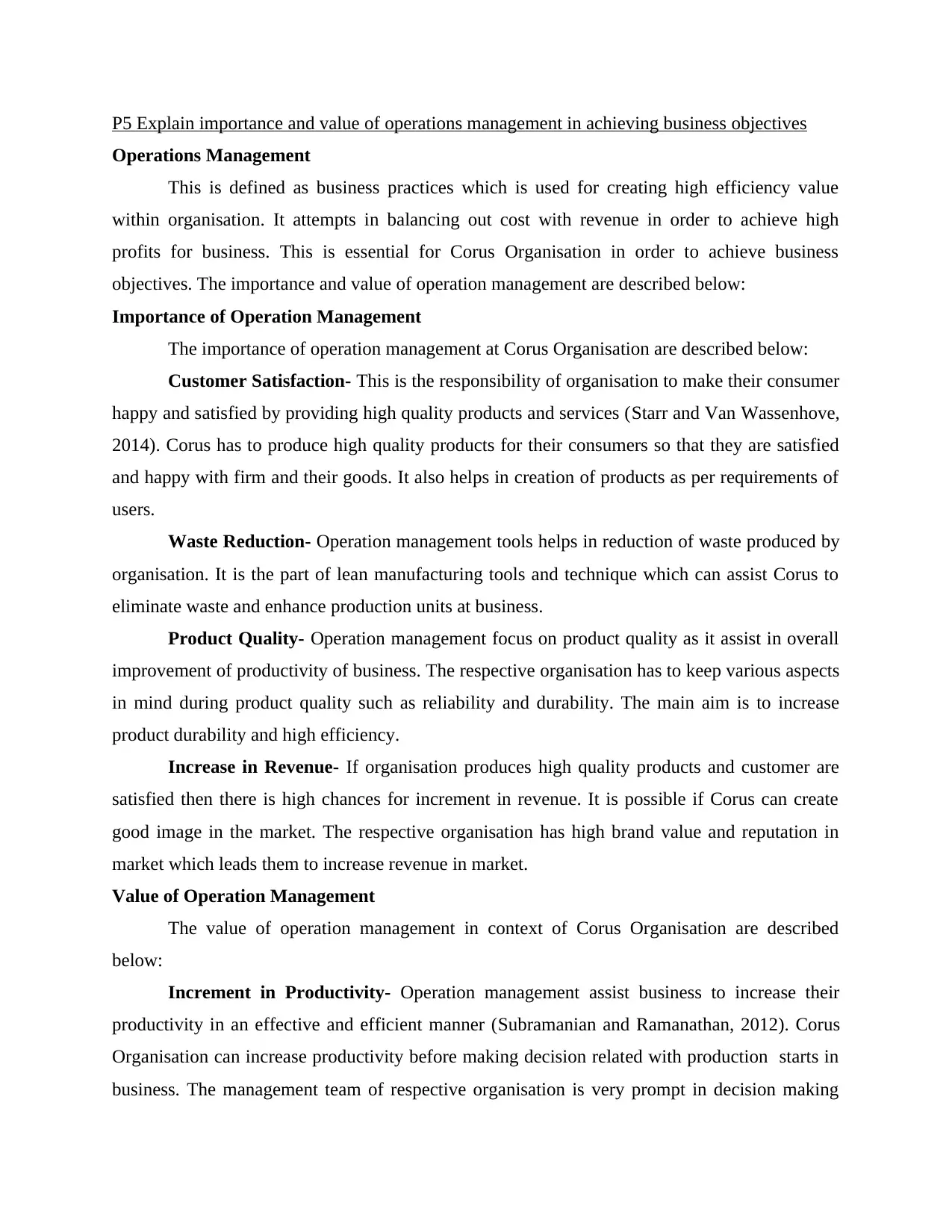
P5 Explain importance and value of operations management in achieving business objectives
Operations Management
This is defined as business practices which is used for creating high efficiency value
within organisation. It attempts in balancing out cost with revenue in order to achieve high
profits for business. This is essential for Corus Organisation in order to achieve business
objectives. The importance and value of operation management are described below:
Importance of Operation Management
The importance of operation management at Corus Organisation are described below:
Customer Satisfaction- This is the responsibility of organisation to make their consumer
happy and satisfied by providing high quality products and services (Starr and Van Wassenhove,
2014). Corus has to produce high quality products for their consumers so that they are satisfied
and happy with firm and their goods. It also helps in creation of products as per requirements of
users.
Waste Reduction- Operation management tools helps in reduction of waste produced by
organisation. It is the part of lean manufacturing tools and technique which can assist Corus to
eliminate waste and enhance production units at business.
Product Quality- Operation management focus on product quality as it assist in overall
improvement of productivity of business. The respective organisation has to keep various aspects
in mind during product quality such as reliability and durability. The main aim is to increase
product durability and high efficiency.
Increase in Revenue- If organisation produces high quality products and customer are
satisfied then there is high chances for increment in revenue. It is possible if Corus can create
good image in the market. The respective organisation has high brand value and reputation in
market which leads them to increase revenue in market.
Value of Operation Management
The value of operation management in context of Corus Organisation are described
below:
Increment in Productivity- Operation management assist business to increase their
productivity in an effective and efficient manner (Subramanian and Ramanathan, 2012). Corus
Organisation can increase productivity before making decision related with production starts in
business. The management team of respective organisation is very prompt in decision making
Operations Management
This is defined as business practices which is used for creating high efficiency value
within organisation. It attempts in balancing out cost with revenue in order to achieve high
profits for business. This is essential for Corus Organisation in order to achieve business
objectives. The importance and value of operation management are described below:
Importance of Operation Management
The importance of operation management at Corus Organisation are described below:
Customer Satisfaction- This is the responsibility of organisation to make their consumer
happy and satisfied by providing high quality products and services (Starr and Van Wassenhove,
2014). Corus has to produce high quality products for their consumers so that they are satisfied
and happy with firm and their goods. It also helps in creation of products as per requirements of
users.
Waste Reduction- Operation management tools helps in reduction of waste produced by
organisation. It is the part of lean manufacturing tools and technique which can assist Corus to
eliminate waste and enhance production units at business.
Product Quality- Operation management focus on product quality as it assist in overall
improvement of productivity of business. The respective organisation has to keep various aspects
in mind during product quality such as reliability and durability. The main aim is to increase
product durability and high efficiency.
Increase in Revenue- If organisation produces high quality products and customer are
satisfied then there is high chances for increment in revenue. It is possible if Corus can create
good image in the market. The respective organisation has high brand value and reputation in
market which leads them to increase revenue in market.
Value of Operation Management
The value of operation management in context of Corus Organisation are described
below:
Increment in Productivity- Operation management assist business to increase their
productivity in an effective and efficient manner (Subramanian and Ramanathan, 2012). Corus
Organisation can increase productivity before making decision related with production starts in
business. The management team of respective organisation is very prompt in decision making
⊘ This is a preview!⊘
Do you want full access?
Subscribe today to unlock all pages.

Trusted by 1+ million students worldwide
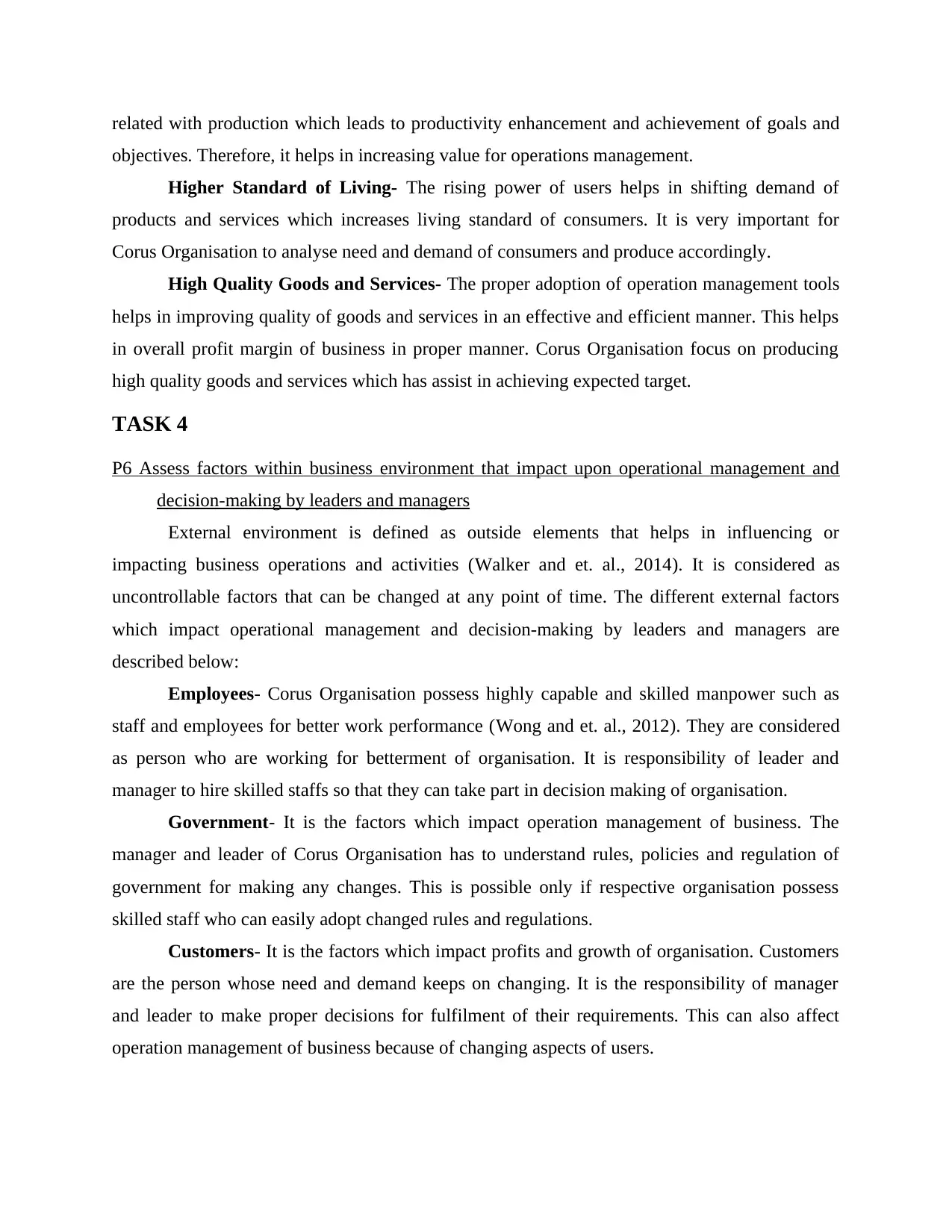
related with production which leads to productivity enhancement and achievement of goals and
objectives. Therefore, it helps in increasing value for operations management.
Higher Standard of Living- The rising power of users helps in shifting demand of
products and services which increases living standard of consumers. It is very important for
Corus Organisation to analyse need and demand of consumers and produce accordingly.
High Quality Goods and Services- The proper adoption of operation management tools
helps in improving quality of goods and services in an effective and efficient manner. This helps
in overall profit margin of business in proper manner. Corus Organisation focus on producing
high quality goods and services which has assist in achieving expected target.
TASK 4
P6 Assess factors within business environment that impact upon operational management and
decision-making by leaders and managers
External environment is defined as outside elements that helps in influencing or
impacting business operations and activities (Walker and et. al., 2014). It is considered as
uncontrollable factors that can be changed at any point of time. The different external factors
which impact operational management and decision-making by leaders and managers are
described below:
Employees- Corus Organisation possess highly capable and skilled manpower such as
staff and employees for better work performance (Wong and et. al., 2012). They are considered
as person who are working for betterment of organisation. It is responsibility of leader and
manager to hire skilled staffs so that they can take part in decision making of organisation.
Government- It is the factors which impact operation management of business. The
manager and leader of Corus Organisation has to understand rules, policies and regulation of
government for making any changes. This is possible only if respective organisation possess
skilled staff who can easily adopt changed rules and regulations.
Customers- It is the factors which impact profits and growth of organisation. Customers
are the person whose need and demand keeps on changing. It is the responsibility of manager
and leader to make proper decisions for fulfilment of their requirements. This can also affect
operation management of business because of changing aspects of users.
objectives. Therefore, it helps in increasing value for operations management.
Higher Standard of Living- The rising power of users helps in shifting demand of
products and services which increases living standard of consumers. It is very important for
Corus Organisation to analyse need and demand of consumers and produce accordingly.
High Quality Goods and Services- The proper adoption of operation management tools
helps in improving quality of goods and services in an effective and efficient manner. This helps
in overall profit margin of business in proper manner. Corus Organisation focus on producing
high quality goods and services which has assist in achieving expected target.
TASK 4
P6 Assess factors within business environment that impact upon operational management and
decision-making by leaders and managers
External environment is defined as outside elements that helps in influencing or
impacting business operations and activities (Walker and et. al., 2014). It is considered as
uncontrollable factors that can be changed at any point of time. The different external factors
which impact operational management and decision-making by leaders and managers are
described below:
Employees- Corus Organisation possess highly capable and skilled manpower such as
staff and employees for better work performance (Wong and et. al., 2012). They are considered
as person who are working for betterment of organisation. It is responsibility of leader and
manager to hire skilled staffs so that they can take part in decision making of organisation.
Government- It is the factors which impact operation management of business. The
manager and leader of Corus Organisation has to understand rules, policies and regulation of
government for making any changes. This is possible only if respective organisation possess
skilled staff who can easily adopt changed rules and regulations.
Customers- It is the factors which impact profits and growth of organisation. Customers
are the person whose need and demand keeps on changing. It is the responsibility of manager
and leader to make proper decisions for fulfilment of their requirements. This can also affect
operation management of business because of changing aspects of users.
Paraphrase This Document
Need a fresh take? Get an instant paraphrase of this document with our AI Paraphraser
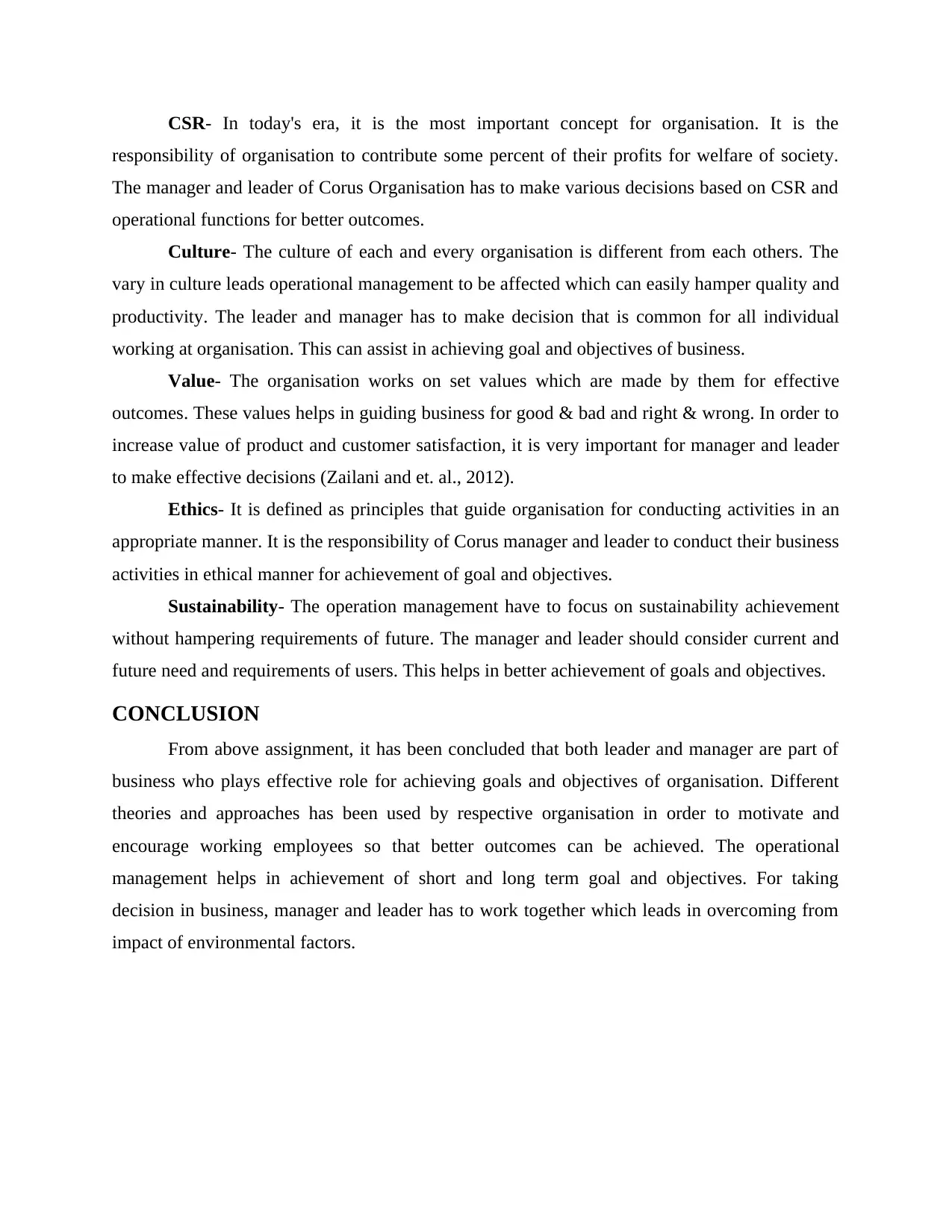
CSR- In today's era, it is the most important concept for organisation. It is the
responsibility of organisation to contribute some percent of their profits for welfare of society.
The manager and leader of Corus Organisation has to make various decisions based on CSR and
operational functions for better outcomes.
Culture- The culture of each and every organisation is different from each others. The
vary in culture leads operational management to be affected which can easily hamper quality and
productivity. The leader and manager has to make decision that is common for all individual
working at organisation. This can assist in achieving goal and objectives of business.
Value- The organisation works on set values which are made by them for effective
outcomes. These values helps in guiding business for good & bad and right & wrong. In order to
increase value of product and customer satisfaction, it is very important for manager and leader
to make effective decisions (Zailani and et. al., 2012).
Ethics- It is defined as principles that guide organisation for conducting activities in an
appropriate manner. It is the responsibility of Corus manager and leader to conduct their business
activities in ethical manner for achievement of goal and objectives.
Sustainability- The operation management have to focus on sustainability achievement
without hampering requirements of future. The manager and leader should consider current and
future need and requirements of users. This helps in better achievement of goals and objectives.
CONCLUSION
From above assignment, it has been concluded that both leader and manager are part of
business who plays effective role for achieving goals and objectives of organisation. Different
theories and approaches has been used by respective organisation in order to motivate and
encourage working employees so that better outcomes can be achieved. The operational
management helps in achievement of short and long term goal and objectives. For taking
decision in business, manager and leader has to work together which leads in overcoming from
impact of environmental factors.
responsibility of organisation to contribute some percent of their profits for welfare of society.
The manager and leader of Corus Organisation has to make various decisions based on CSR and
operational functions for better outcomes.
Culture- The culture of each and every organisation is different from each others. The
vary in culture leads operational management to be affected which can easily hamper quality and
productivity. The leader and manager has to make decision that is common for all individual
working at organisation. This can assist in achieving goal and objectives of business.
Value- The organisation works on set values which are made by them for effective
outcomes. These values helps in guiding business for good & bad and right & wrong. In order to
increase value of product and customer satisfaction, it is very important for manager and leader
to make effective decisions (Zailani and et. al., 2012).
Ethics- It is defined as principles that guide organisation for conducting activities in an
appropriate manner. It is the responsibility of Corus manager and leader to conduct their business
activities in ethical manner for achievement of goal and objectives.
Sustainability- The operation management have to focus on sustainability achievement
without hampering requirements of future. The manager and leader should consider current and
future need and requirements of users. This helps in better achievement of goals and objectives.
CONCLUSION
From above assignment, it has been concluded that both leader and manager are part of
business who plays effective role for achieving goals and objectives of organisation. Different
theories and approaches has been used by respective organisation in order to motivate and
encourage working employees so that better outcomes can be achieved. The operational
management helps in achievement of short and long term goal and objectives. For taking
decision in business, manager and leader has to work together which leads in overcoming from
impact of environmental factors.
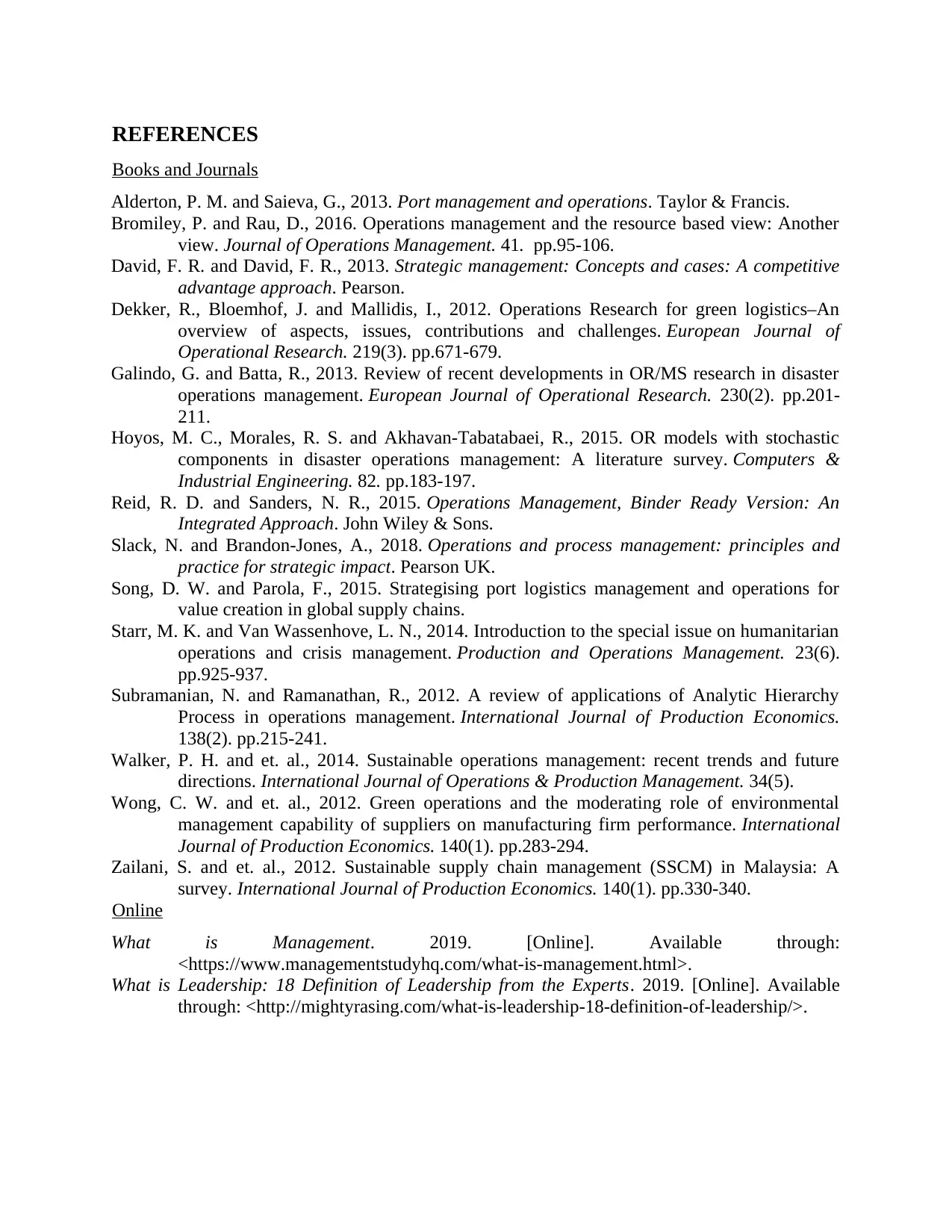
REFERENCES
Books and Journals
Alderton, P. M. and Saieva, G., 2013. Port management and operations. Taylor & Francis.
Bromiley, P. and Rau, D., 2016. Operations management and the resource based view: Another
view. Journal of Operations Management. 41. pp.95-106.
David, F. R. and David, F. R., 2013. Strategic management: Concepts and cases: A competitive
advantage approach. Pearson.
Dekker, R., Bloemhof, J. and Mallidis, I., 2012. Operations Research for green logistics–An
overview of aspects, issues, contributions and challenges. European Journal of
Operational Research. 219(3). pp.671-679.
Galindo, G. and Batta, R., 2013. Review of recent developments in OR/MS research in disaster
operations management. European Journal of Operational Research. 230(2). pp.201-
211.
Hoyos, M. C., Morales, R. S. and Akhavan-Tabatabaei, R., 2015. OR models with stochastic
components in disaster operations management: A literature survey. Computers &
Industrial Engineering. 82. pp.183-197.
Reid, R. D. and Sanders, N. R., 2015. Operations Management, Binder Ready Version: An
Integrated Approach. John Wiley & Sons.
Slack, N. and Brandon-Jones, A., 2018. Operations and process management: principles and
practice for strategic impact. Pearson UK.
Song, D. W. and Parola, F., 2015. Strategising port logistics management and operations for
value creation in global supply chains.
Starr, M. K. and Van Wassenhove, L. N., 2014. Introduction to the special issue on humanitarian
operations and crisis management. Production and Operations Management. 23(6).
pp.925-937.
Subramanian, N. and Ramanathan, R., 2012. A review of applications of Analytic Hierarchy
Process in operations management. International Journal of Production Economics.
138(2). pp.215-241.
Walker, P. H. and et. al., 2014. Sustainable operations management: recent trends and future
directions. International Journal of Operations & Production Management. 34(5).
Wong, C. W. and et. al., 2012. Green operations and the moderating role of environmental
management capability of suppliers on manufacturing firm performance. International
Journal of Production Economics. 140(1). pp.283-294.
Zailani, S. and et. al., 2012. Sustainable supply chain management (SSCM) in Malaysia: A
survey. International Journal of Production Economics. 140(1). pp.330-340.
Online
What is Management. 2019. [Online]. Available through:
<https://www.managementstudyhq.com/what-is-management.html>.
What is Leadership: 18 Definition of Leadership from the Experts. 2019. [Online]. Available
through: <http://mightyrasing.com/what-is-leadership-18-definition-of-leadership/>.
Books and Journals
Alderton, P. M. and Saieva, G., 2013. Port management and operations. Taylor & Francis.
Bromiley, P. and Rau, D., 2016. Operations management and the resource based view: Another
view. Journal of Operations Management. 41. pp.95-106.
David, F. R. and David, F. R., 2013. Strategic management: Concepts and cases: A competitive
advantage approach. Pearson.
Dekker, R., Bloemhof, J. and Mallidis, I., 2012. Operations Research for green logistics–An
overview of aspects, issues, contributions and challenges. European Journal of
Operational Research. 219(3). pp.671-679.
Galindo, G. and Batta, R., 2013. Review of recent developments in OR/MS research in disaster
operations management. European Journal of Operational Research. 230(2). pp.201-
211.
Hoyos, M. C., Morales, R. S. and Akhavan-Tabatabaei, R., 2015. OR models with stochastic
components in disaster operations management: A literature survey. Computers &
Industrial Engineering. 82. pp.183-197.
Reid, R. D. and Sanders, N. R., 2015. Operations Management, Binder Ready Version: An
Integrated Approach. John Wiley & Sons.
Slack, N. and Brandon-Jones, A., 2018. Operations and process management: principles and
practice for strategic impact. Pearson UK.
Song, D. W. and Parola, F., 2015. Strategising port logistics management and operations for
value creation in global supply chains.
Starr, M. K. and Van Wassenhove, L. N., 2014. Introduction to the special issue on humanitarian
operations and crisis management. Production and Operations Management. 23(6).
pp.925-937.
Subramanian, N. and Ramanathan, R., 2012. A review of applications of Analytic Hierarchy
Process in operations management. International Journal of Production Economics.
138(2). pp.215-241.
Walker, P. H. and et. al., 2014. Sustainable operations management: recent trends and future
directions. International Journal of Operations & Production Management. 34(5).
Wong, C. W. and et. al., 2012. Green operations and the moderating role of environmental
management capability of suppliers on manufacturing firm performance. International
Journal of Production Economics. 140(1). pp.283-294.
Zailani, S. and et. al., 2012. Sustainable supply chain management (SSCM) in Malaysia: A
survey. International Journal of Production Economics. 140(1). pp.330-340.
Online
What is Management. 2019. [Online]. Available through:
<https://www.managementstudyhq.com/what-is-management.html>.
What is Leadership: 18 Definition of Leadership from the Experts. 2019. [Online]. Available
through: <http://mightyrasing.com/what-is-leadership-18-definition-of-leadership/>.
⊘ This is a preview!⊘
Do you want full access?
Subscribe today to unlock all pages.

Trusted by 1+ million students worldwide
1 out of 12
Related Documents
Your All-in-One AI-Powered Toolkit for Academic Success.
+13062052269
info@desklib.com
Available 24*7 on WhatsApp / Email
![[object Object]](/_next/static/media/star-bottom.7253800d.svg)
Unlock your academic potential
Copyright © 2020–2026 A2Z Services. All Rights Reserved. Developed and managed by ZUCOL.





